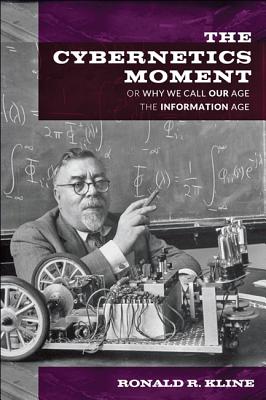The Cybernetics Moment: Or Why We Call Our Age the Information Age

The Cybernetics Moment: Or Why We Call Our Age the Information Age
Outstanding Academic Title, Choice
Cybernetics--the science of communication and control as it applies to machines and to humans--originates from efforts during World War II to build automatic antiaircraft systems. Following the war, this science extended beyond military needs to examine all systems that rely on information and feedback, from the level of the cell to that of society. In The Cybernetics Moment, Ronald R. Kline, a senior historian of technology, examines the intellectual and cultural history of cybernetics and information theory, whose language of "information," "feedback," and "control" transformed the idiom of the sciences, hastened the development of information technologies, and laid the conceptual foundation for what we now call the Information Age.
Kline argues that, for about twenty years after 1950, the growth of cybernetics and information theory and ever-more-powerful computers produced a utopian information narrative--an enthusiasm for information science that influenced natural scientists, social scientists, engineers, humanists, policymakers, public intellectuals, and journalists, all of whom struggled to come to grips with new relationships between humans and intelligent machines.
Kline traces the relationship between the invention of computers and communication systems and the rise, decline, and transformation of cybernetics by analyzing the lives and work of such notables as Norbert Wiener, Claude Shannon, Warren McCulloch, Margaret Mead, Gregory Bateson, and Herbert Simon. Ultimately, he reveals the crucial role played by the cybernetics moment--when cybernetics and information theory were seen as universal sciences--in setting the stage for our current preoccupation with information technologies.
PRP: 265.05 Lei
Acesta este Pretul Recomandat de Producator. Pretul de vanzare al produsului este afisat mai jos.
238.54Lei
238.54Lei
265.05 LeiLivrare in 2-4 saptamani
Descrierea produsului
Outstanding Academic Title, Choice
Cybernetics--the science of communication and control as it applies to machines and to humans--originates from efforts during World War II to build automatic antiaircraft systems. Following the war, this science extended beyond military needs to examine all systems that rely on information and feedback, from the level of the cell to that of society. In The Cybernetics Moment, Ronald R. Kline, a senior historian of technology, examines the intellectual and cultural history of cybernetics and information theory, whose language of "information," "feedback," and "control" transformed the idiom of the sciences, hastened the development of information technologies, and laid the conceptual foundation for what we now call the Information Age.
Kline argues that, for about twenty years after 1950, the growth of cybernetics and information theory and ever-more-powerful computers produced a utopian information narrative--an enthusiasm for information science that influenced natural scientists, social scientists, engineers, humanists, policymakers, public intellectuals, and journalists, all of whom struggled to come to grips with new relationships between humans and intelligent machines.
Kline traces the relationship between the invention of computers and communication systems and the rise, decline, and transformation of cybernetics by analyzing the lives and work of such notables as Norbert Wiener, Claude Shannon, Warren McCulloch, Margaret Mead, Gregory Bateson, and Herbert Simon. Ultimately, he reveals the crucial role played by the cybernetics moment--when cybernetics and information theory were seen as universal sciences--in setting the stage for our current preoccupation with information technologies.
Detaliile produsului









